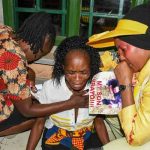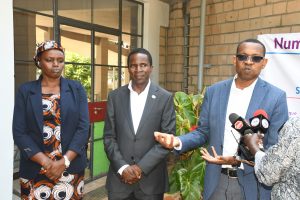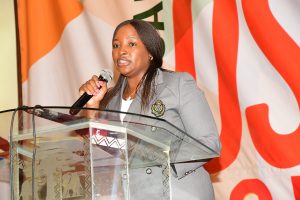The Centre for Mathematics, Science and Technology Education in Africa (CEMASTEA) in Partnership with ZiZi Afrique Foundation (ZAK) hosted Kenya’s first numeracy workshop to discuss the challenges facing mathematics education and broader implications for STEM learning in Kenya.
The event themed ‘Foundational Numeracy in Kenya; Status, Challenges and opportunities’ brought together educational experts, researchers and civil organizations with an aim to develop an action plan to improve the numeracy learning outcomes in Kenya.
The experts underscored the urgent need for systemic reforms to improve foundational numeracy, address learning disparities and change societal attitudes towards math and science subjects.
ZAK is a nonprofit organization, dedicated to transform learning outcomes for children and youth furthest behind and leverages on research to drive systematic improvement in public education, while CEMASTEA is Semi-Autonomous Government Agency under the Ministry of Education, Science and Technology, that enhance the quality of mathematics and Science education, through in service education and Training for Teachers in Kenya.
Speaking, Wednesday, at the event, Zizi Afrique Foundation, Director of Innovation, Virginia Ngindiru, emphasized on the importance of foundational skills for all children in Kenya.
“We look at ensuring that children are well prepared for learning. We generate evidence, translate it into practice, and work with partners to explore innovative ways, to improve learning outcomes,” she noted.
Ngindiru highlighted significant gaps in numeracy skills, revealing that a large proportion of students are progressing through the education system without mastering basic math concepts.
“The data shows that even by Grade 6, many children have not acquired foundational numeracy skills. At Grade 3, over half of the learners still struggle with basic arithmetic,” she stated.
Additionally, she stressed the need for evidence-driven educational improvements and better use of learning resources, noting that ineffective teaching methodologies contribute to the problem, with many classrooms failing to make math engaging or applicable to real-life situations.
The discussion also explored classroom practices and the need for a more hands-on, practical approach to teaching mathematics.
“Learning is still not practical enough. We know that children first grasp concepts by manipulating concrete objects before transitioning to abstract reasoning. However, there is low uptake of teaching and learning resources, and many teachers continue using outdated methods,” Ngindiru observed.
She also pointed to the role of parents in supporting learning at home, adding that many feel ill-equipped to help their children, due to a lack of understanding of the curriculum.
“Schools need to make parent meetings more meaningful, moving beyond grades to helping parents understand what the curriculum expects of their children,” she urged.
Concurrently, Executive Director of Zizi Afrique Foundation, Dr John Mugo, delivered a stark warning about the state of math education in Kenya.
“We are staring at a national crisis, and we have not been bold enough to address it. In KCSE, the number of students who fail mathematics, is almost equal to all other subjects combined. Yet, we keep celebrating the few A’s, while ignoring the crisis affecting the majority,” he lamented.
Mugo underscored that poor math performance is not a secondary school issue, but a foundational problem that starts early.
“Half of the students completing Grade 6, lack foundational numeracy skills. If a learner struggles with a simple subtraction problem such as 61 minus 12, it indicates a systemic failure in early education,” he noted.
He further revealed that research shows that 40 percent of mathematics teachers struggle with the very concepts they teach.
“Why have we remained silent about this crisis? It’s time for a national conversation on how to improve math instruction from the earliest levels,” he asserted.
Dr. Mugo called for a collaborative approach, urging stakeholders to analyze common errors students make and develop targeted interventions.
“Rather than just marking answers as right or wrong, teachers should analyze frequent mistakes, to adjust their teaching methods. If we take a strategic approach, we can gradually improve math performance from 50 percent failure at Grade 6 to 80percent proficiency,” he said.
He advocated for a shift in mindset from job-seeking to problem-solving, emphasizing that STEM education should equip students with the skills to create opportunities rather than simply look for employment.
Making his Remarks, Usawa Agenda, Executive Director, Dr Emmanuel Manyasa, attributed to systematic biases within schools, since a major concern raised at the forum was the gender disparity in mathematics performance at higher education levels.
“I had a teacher in Form One who told us that math is not for everyone. That kind of messaging impacts how students, particularly girls, perceive their abilities,” he recounted.
Manyasa pointed out that while boys and girls perform similarly at lower grades, disparities emerge as they advance in their education.
“In the KCSE, boys dominate in over 20 subjects, all of which are math-oriented. This indicates that something in the school system discourages girls from pursuing STEM subjects,” he explained.
Manyasa stressed the need for deliberate investments in STEM education, including teacher training, parental engagement and a shift in mindset towards math learning.
“If Kenya is to meet its commitment of having 60 percent of student’s transition to STEM fields, we must address these issues. We need to equip teachers, change conversations at home, and ensure math education aligns with the national vision,” he asserted.
He also emphasized the importance of addressing teacher workloads, stating that large class sizes hinder effective instruction and limit personalized learning experiences.
The Education experts recommended approaches towards math and STEM education including, improving teacher training, to ensure educators have the necessary skills to teach math effectively, introducing hands-on learning methodologies that move beyond rote memorization to practical applications, engaging parents more meaningfully in their children’s education to foster a positive math-learning environment and Shifting national policies, to prioritize STEM and align education reforms with economic development goals.
The forum served as a wake-up call to education stakeholders, highlighting the need for immediate and coordinated action to improve mathematics education in Kenya. As the country pushes towards a knowledge-based economy, experts insist that fixing the math crisis is not just an academic issue but a national priority.
By Sharon Atieno










